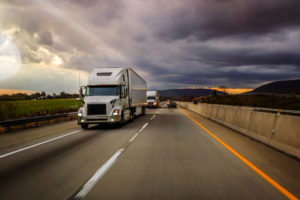By Pras Subramanian, Yahoo News
Uber Freight (UBER) thinks it has a solution to the ongoing truck driver shortage here in the U.S.
The unit, which is Uber’s trucking logistics and supply chain management offering, said in a report released earlier this month that autonomous trucking is the key to solving the driver shortage crisis — but not because the industry won’t need drivers. They’ll just be doing a different type of driving.
“We’re getting ready for that future with drivers that will be available on both sides of the autonomous freight, available to pick up and drop off the freight that is being hauled by the autonomous truck by providing a network of drop trails on both ends that will allow for that move to happen,” said Lior Ron, the head of Uber Freight in an interview with Yahoo Finance Live.
What Uber is envisioning is a hub-to-hub system — a hybrid of human drivers working with autonomous trucks.
“Hub-to-hub essentially means that you only do the autonomous freight between a hub off the highway, close to the origin of the load, and a hub close to the destination of the load,” Ron said. “In between, the autonomous freight can run on the highway in a very predictable, very repeatable way.”
At each hub, human drivers will transport goods from essentially the first mile to the hub and the last mile from the destination hub to the final destination.
“We believe that model is much more scalable. We believe that model can actually have the density of freight you need,” Ron said. “This is going to be like the airline — you need to have as much freight going on that truck back and forth.”
Ron and Uber believe that even with such a system, the trucking industry will need more drivers for first and last mile delivery than is currently needed. While this sounds problematic given the trucker shortage the nation is experiencing, Uber said the demands of the hub-to-hub system will make the profession more attractive.
“Autonomous trucks on the long-haul middle mile would enable humans to shift to local hauls, boosting demand for skilled drivers in the local sector. Drivers will have more control over their work and be able to stay closer to home,” Uber said in its autonomous trucking report.
Currently, Uber is working with autonomous tech partners Waymo (GOOGL) and Aurora to build out its future network.
“With Aurora, we’re actively testing in Texas as we speak. We’re hauling a couple of those loads on a weekly basis to really understand the operational model,” Ron said.
The testing will allow Uber to see what hub-to-hub transfers might look like, and if the economics of switching back and forth between human driver and autonomous truck make sense.
Bigger questions include how Uber Freight and its partners will work with regulators, and if the technology is ready to deploy at scale. Ron and Uber Freight believe the system they have devised and the testing that will take place over millions of miles will prove it out.
“We think that the autonomous future is almost upon us,” he said. “And if you look at the technology maturity, we believe that in the next few years, we’re going to see autonomous trucks deployed on U.S. highways.”

